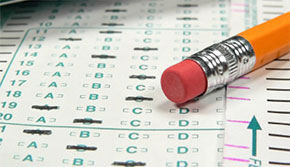Senate Bill Looks At Testing Fallout
March 20, 2015
A Senate panel approved a revamped version of testing legislation Thursday, potentially paving the way for an audit of the botched rollout of the state’s new standardized tests and making clear that school districts would be repaid if the state recovers damages from the contractor running the exams.
The new version of the legislation (SB 616) also moves closer to a similar proposal from the House (HB 7069), lawmakers said, and provides additional flexibility for school districts when it comes to evaluating teachers.
 The Senate Education Appropriations Subcommittee voted 7-1 to approve the measure.
The Senate Education Appropriations Subcommittee voted 7-1 to approve the measure.
State officials still have not decided whether to pursue sanctions against American Institutes for Research, a non-profit group that signed a six-year, $220 million deal with the state to develop and administer the new Florida Standards Assessments. The first round of testing earlier this month was plagued by slow logins, other technology issues and, ultimately, a suspected cyber-attack.
But an amendment to the Senate bill by Sen. John Legg, R-Lutz, would require that money be returned to school districts if the state does recover any.
“In summary, we are requesting that the DOE go after any liquidated damages that the state may be entitled to as a result of this rollout, and then that we would reimburse and funnel those moneys back to the districts to help them offset some of the costs that could have or may occur as a result of administrating any assessments,” Legg said.
Another amendment, offered by Sen. Jeremy Ring, D-Margate, calls for an audit if the testing administration “does not comply with the minimum assessment protocols and requirements established by the department.”
AIR has shouldered most of the blame for the troubled introduction of the tests, which came as lawmakers were already looking at legislation to pare back assessments amid parental complaints of over-testing.
Changes to the Senate bill would also give school districts more flexibility on some assessments and in setting standards for different levels of achievement on teachers’ evaluations. The House bill has been received more favorably by education advocates, in part because it gives districts more leeway.
Most of the original provisions of the Senate bill remain. The proposal would cap at 5 percent the share of students’ time that can be spent on testing and scrap a law requiring school districts to come up with end-of-course tests in classes where the state doesn’t administer such exams.
It would also allow schools and school districts to seek waivers from being assigned letter grades due to implementation issues with the state’s new test — if they give up school recognition funding — and would reduce from 50 percent to a third the portion of a teacher’s evaluation tied to student performance.
“It’s fewer, better, flexible, more transparent and more-timely tests, and I think that’s something that we need to move towards for our students,” Legg said.
But it still falls short of what some members of the public and lawmakers want. Sen. Dwight Bullard, D-Miami, called for additional changes, including allowing parents in some cases to request their students be given a paper and pencil version of computerized tests. All of Bullard’s amendments were defeated.
Bullard, who was the only member of the committee to vote against the bill Thursday, said it was improving.
“Unfortunately, I still think we have about a Grand Canyon’s-wide chasm between where we need to be and where we are,” he said.
by Brandon Larrabee, The News Service of Florida



Comments